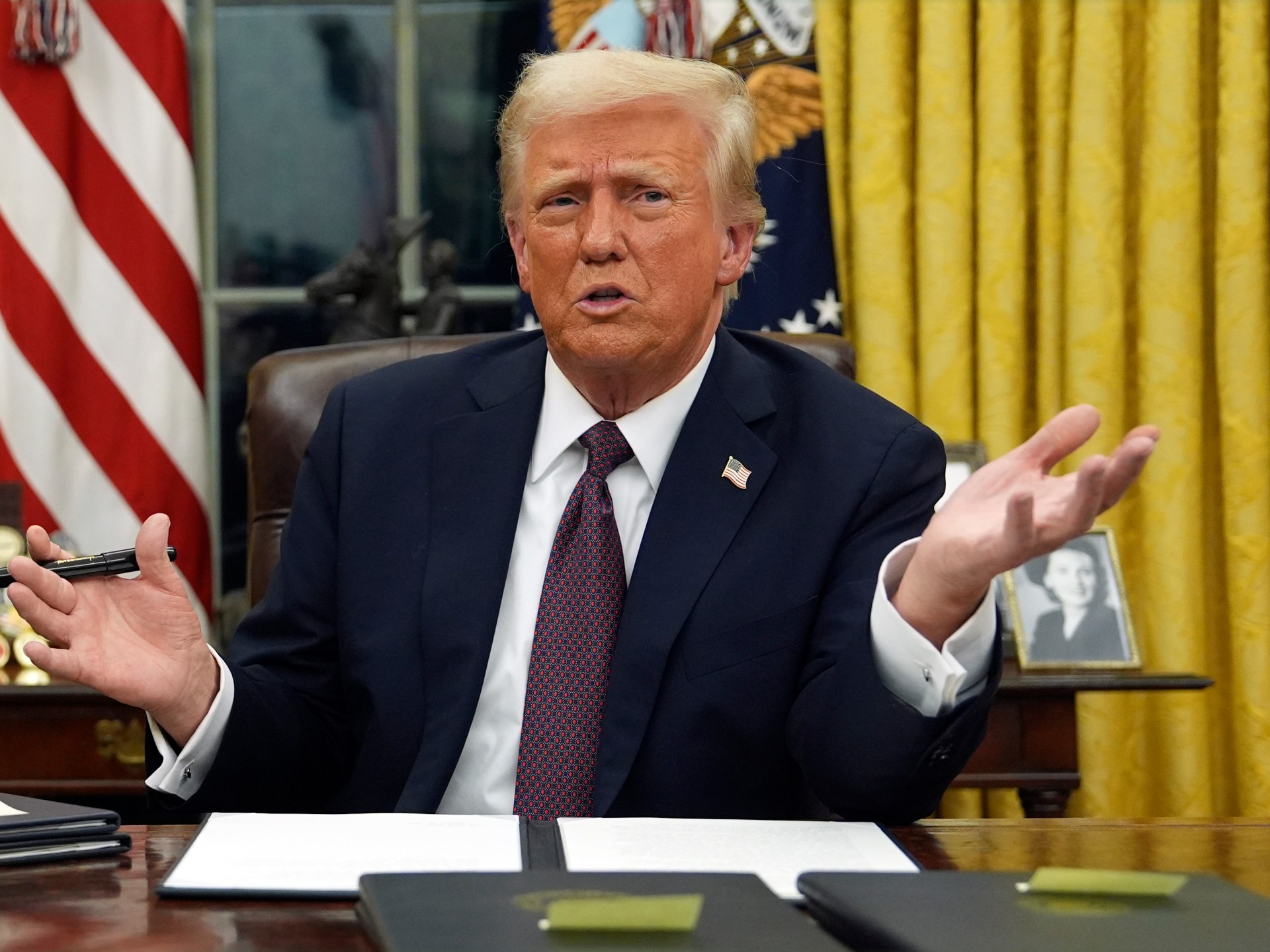Social media posts have warned for more than a month that President Donald Trump would declare martial law on April 20, which typically means suspending civil law while the military takes control of civilian functions such as courts.
But many of the posts appeared to conflate martial law with the potential invocation of the Insurrection Act of 1807, which was mentioned in a recent executive order.
“I just learned about this executive order (section 6-b) which says Trump will invoke the Insurrection Act of 1807 on April 20th which will (amount) to declaring martial law”, a Reddit user posted on March 19. “That’s the end of the USA”.
The narrative spread beyond Reddit to Facebook posts and videos shared on TikTok, X and Threads.
Trump’s January 20 executive order declared a national emergency at the US southern border and required the defence and homeland security secretaries to submit a report on border conditions within 90 days. The report should include “any recommendations regarding additional actions that may be necessary to obtain complete operational control of the southern border, including whether to invoke the Insurrection Act of 1807”, the executive order said.
April 20 is the 90-day deadline.
Invoking the Insurrection Act would allow Trump to direct federal military personnel to enforce federal law at the US southern border. But legal experts told PolitiFact it would not amount to martial law. They said they do not see a clear path for Trump to lawfully implement martial law in the way it’s commonly understood. Trump, on his part, has not publicly discussed martial law.
In a statement to PolitiFact, the Defense Department said the agency is working with the Homeland Security Department to develop the requested report on the southern border conditions.
PolitiFact contacted the Homeland Security Department and the White House and received no response.
What would the Insurrection Act invocation allow?
Invoking the , Insurrection Act , temporarily suspends , another US law , that forbids federal troops from conducting civilian law enforcement.
A president can invoke the law after determining that “unlawful obstructions, combinations, or assemblages, or rebellion” against the federal government make it “impracticable to enforce” US law “by the ordinary course of judicial proceedings”. In those cases, the Insurrection Act would allow the president to direct federal troops “as he considers necessary to enforce those laws or to suppress the rebellion”.
The Insurrection Act is broadly written and does not define terms such as “insurrection” or “rebellion”. In 1827, the US Supreme Court ruled that the authority to decide whether a situation represents an acceptable reason to invoke the Insurrection Act “belongs exclusively to the President”.
Chris Edelson, an American University assistant professor of government, said the law provides a “limited authority for the president to use the military to respond to genuine emergencies – a breakdown in regular operational law when things are really falling apart”.
The act was invoked when southern governors , refused to integrate schools , and , during the 1992 Los Angeles riots, after four white police officers were acquitted in the roadside beating of a Black man, Rodney King.
Experts expressed doubt that the situation at the US southern border constitutes a breakdown or obstruction of federal law that would necessitate the use of the Insurrection Act the way the law was intended.
Tung Yin, a Lewis and Clark Law School professor, said it’s hard to see how immigrants coming into the country illegally were obstructing state or federal laws.
Obstruction is “more like an invading army or maybe such severe riots that the government has lost control”, he said.
Martial law, on the other hand,  , typically refers , to imposing military law on civilians.
Edelson said the Insurrection Act “does not allow the president to completely replace regular authorities with military authority”.
Chris Mirasola, University of Houston Law Center assistant professor, said military law is more stringent and has fewer protections for people than civilian law. US constitutional protections would not disappear if the Insurrection Act were invoked, Mirasola said.
Yin said that when a president uses the Insurrection Act to call on the military to enforce civilian law, “that might seem like ‘ martial law ‘ to a layperson. But it’s not a military government, which might be what people generally think of”.
Can Trump impose martial law at the southern border?
In a 1946 ruling, the US Supreme Court wrote that the term martial law “carries no precise meaning” and said it wasn’t defined in the Constitution or an act of Congress.
Edelson said because of this, “At the federal level, it’s not clear that presidents can declare martial law at all”.
Mirasola said some other countries ‘ constitutions include provisions that outline when a president can declare martial law, but the US Constitution lacks such detail.
Still, martial law has been declared before. The US imposed , martial law , in Hawaii , for three years after the 1941 Japanese attack on Pearl Harbor. President Abraham Lincoln also , declared martial law in certain parts of the US during the Civil War. President Andrew Johnson , restored , civilian law.
At that time, the Supreme Court “more or less found that martial law could only be declared in an active war zone”, Mirasola said, citing an 1866 Supreme Court ruling that held that martial law cannot be imposed unless civilian courts aren’t open and functioning.
For that reason, Mirasola said he could see no legal or constitutional basis for Trump to declare martial law to control the southern border, which “is not an area of active hostilities, notwithstanding how the administration continues to talk about the actions of cartels”.
“The circumstances within which presidents have invoked martial law and that the Supreme Court has understood martial law are incredibly narrow”, he said. “It would require an active hostility on US territory that prevents civilian legal proceedings from occurring”.
Experts said Trump’s suggestions about using military powers could be one reason for the martial law speculation: In October, Trump , said “radical left lunatics” in the US “should be very easily handled by, if necessary, by National Guard, or if really necessary, by the military”.
In June 2020, during nationwide protests following the death of George Floyd, Trump said if governors didn’t deploy the National Guard to sufficiently “dominate the streets”, he would order the US military to “quickly solve the problem for them”.
Then there is his willingness to challenge constitutional precedent.
He is trying to , end birthright citizenship , by executive order, the move was blocked by multiple federal judges, including one who described the order as “blatantly unconstitutional”.
In mid-March, Trump said the US is being invaded by a Venezuelan gang and invoked the Alien Enemies Act of 1798, an obscure law that was used , to detain or deport foreign nationals from enemy nations without due process during wartime. The Supreme Court lifted a lower court’s , order that temporarily halted , deportations of Venezuelan migrants under the law. It , did not rule , whether Trump’s use of the law was constitutional.
Edelson mentioned the January 6, 2021 attack on the US Capitol, and the fact that Trump pardoned about 1, 500 people charged with crimes that day.




